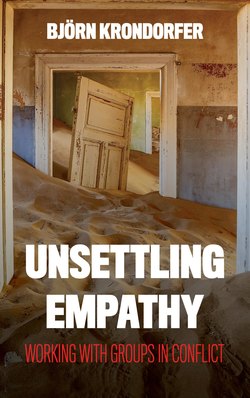Unsettling Empathy

Реклама. ООО «ЛитРес», ИНН: 7719571260.
Оглавление
Bjorn Krondorfer. Unsettling Empathy
Acknowledgments
Introduction
Unsettling Empathy
Facilitation
Hesitations
Structure
Notes
Frames
Reconciliation
Reconciliation as a Concept
Reconciliation as a Practice
You Are What You Eat
Political and Social Reconciliation
Feel Like a Clown
Acknowledgment: Akeem’s Story
Trust
Notes
Memory
Reconciliation and Memory Work
I Wish the Soap Would Burn Your Hands
Post-Shoah Jewish Generations
Memory Objects
Postwar German Generations
Our Two-Hundred-Year Present
Frauengeschichte: A Woman’s Family Constellation
The Truth Almost Drove Me Mad
Coda
Responsibility toward the Future
Notes
Trauma
Trauma Discourse
When I Walked in My Grandmother’s Shoes
Now I Know What to Do
Fear Is Contagious
Between Trauma and Politics
Notes
Empathy
Two Poles of Empathy
What Do You (Not) See?
Empathy That Unsettles
We Are in This History Together
Unsettling as a Critical Practice
Notes
Dynamics and Approaches
Taking Risks, Telling Stories
Master Narratives
Death to the Arabs
The Key: Chosen Trauma and Large-Group Identity
The Confining Effect of Mirrors
I Was Afraid of Being Kidnapped
Notes
Haunting
Fathers
Ghostly Appearance
Containing the Ghost
Not the Dead but the Gaps Haunt Us
Outlook
Notes
Frustrations
Missing Cues
Imbalances
Responsibilities
Who Benefits?
Exclusions
Undeterred
Notes
Stepping into Time and onto Loaded Words
Elephant in the Room
Homecoming
Stepping into Time
Asserting a Woman’s Place
Notes
Triangulating
We Are Not in a Zoo
Triangulation
Turning My Back Because I Trust You
Realizing Its Potential
Notes
The Art of Wit(h)nessing
Secondary Witnessing
At-Homeness
Wit(h)nessing
Material Witness
Interstices of Time
Notes
Epilogue
Notes
Glossary
FRAMES
DYNAMICS
APPROACHES
Bibliography
Index
Отрывок из книги
Though the bulk of this book was written during my 2019 spring sabbatical, Unsettling Empathy has been in the making for a long time. I have published smaller pieces on reconciliatory processes and unsettling empathy over the years, but I always found it daunting to write a more comprehensive account of my work with groups in conflict. People familiar with or curious about my work kept asking about such a book because they wanted to learn more about how trust-building intergroup processes unfold in conflict settings. They wanted to understand the dynamics that make or break a process in which people explore adversarial relations due to past and present injuries and injustices. I hope that Unsettling Empathy meets their expectations.
Twenty-five years ago I published my first monograph, Remembrance and Reconciliation: Encounters Between Young Jews and Germans (1995). In that book I tried to make sense of how the Holocaust affected relationships between non-Jewish Germans and Jewish Americans born after 1945. I reported on various encounters between these two groups, relying on examples from the then-available literature as well as on my own experience as active participant and facilitator. I situated and contextualized these encounters within the intellectual and public debates of the 1980s and 1990s on Vergangenheitsbewältigung (coming to terms with the past). The book emphasized the vital role of memory in dialogue and reconciliation settings. Without fully acknowledging the past, I argued, trust would be impossible to establish, thus thwarting the restoring of relationships between the Jewish community and German society.
.....
Similar to my wording of “enclaves of sameness,” Daniel Bar-Tal and Dikla Antebi speak of the “siege mentality” of communities that have established a sense of collective and competitive victimhood. Such a mentality contributes to a lack of empathizing with the suffering of others (“Siege Mentality in Israel” 1992).
5.
.....